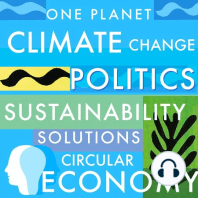20 min listen

Todd Kashdan - Award-winning Author of “The Art of Insubordination: How to Dissent and Defy Effectively”
Todd Kashdan - Award-winning Author of “The Art of Insubordination: How to Dissent and Defy Effectively”
ratings:
Length:
58 minutes
Released:
Nov 15, 2022
Format:
Podcast episode
Description
Todd B. Kashdan, Ph.D., is professor of psychology at George Mason University, and a leading authority on well-being, curiosity, courage, and resilience. He has published more than 220 scientific articles, his work has been cited more than 35,000 times, and he received the American Psychological Association’s Award for Distinguished Scientific Early Career Contributions to Psychology. He is the author of several books, including The Art of Insubordination: How to Dissent and Defy Effectively, Curious? and The Upside of Your Dark Side, and has been translated into more than fifteen languages. His research is featured regularly in The New York Times, The Atlantic, and Time, and his writing has appeared in the Harvard Business Review, National Geographic, and other publications. He is a keynote speaker and consultant for organizations as diverse as Microsoft, Mercedes-Benz, Prudential, General Mills, The United States Department of Defense, and World Bank Group. “That's the challenging part. And I think part of what I'm trying to do to educate the public about this: Part of being persuasive is acknowledging the two-sided message of trying to talk about climate change. So everyone talks about the benefits, and no one talks about the costs. You have to acknowledge short-term sacrifices, financially, socially, and then value-wise. If you've identified with a group where the origin of the Fords, you know, Ford Model T cars, and if you're really a big car aficionado, and you like Mustangs and BMWs and Lamborghinis...is that this requires a deviation from an affinity that you identify with. People who are social activists about climate change, they do not acknowledge that there are psychological costs and social costs for individuals that haven't had the buy-in yet. And because of that, their critics can pounce on them immediately and say, 'I have too many pleasures and I have an intact family that is functioning well, and my company is doing well. So why would I risk any of that for this 10, 20-year message that you're giving me?' So the two-sided message is effective if you have the confidence that you can talk about the logistics and the economics that are involved with these issues."https://toddkashdan.comwww.penguinrandomhouse.com/books/690674/the-art-of-insubordination-by-todd-b-kashdan-phd/www.creativeprocess.infowww.oneplanetpodcast.orgInstagram @creativeprocesspodcast
Released:
Nov 15, 2022
Format:
Podcast episode
Titles in the series (100)
WILLIAM McDONOUGH: Interviewed by Mia Funk & Andrew Medlin · Associate Podcast Producer Andrew Medlin by Sustainability, Climate Change, Renewable Energy, Politics, Activism, Biodiversity, Carbon Footprint, Wildlife, Regenerative Agriculture, Circular Economy, Extinction, Net-Zero · One Planet Podcast